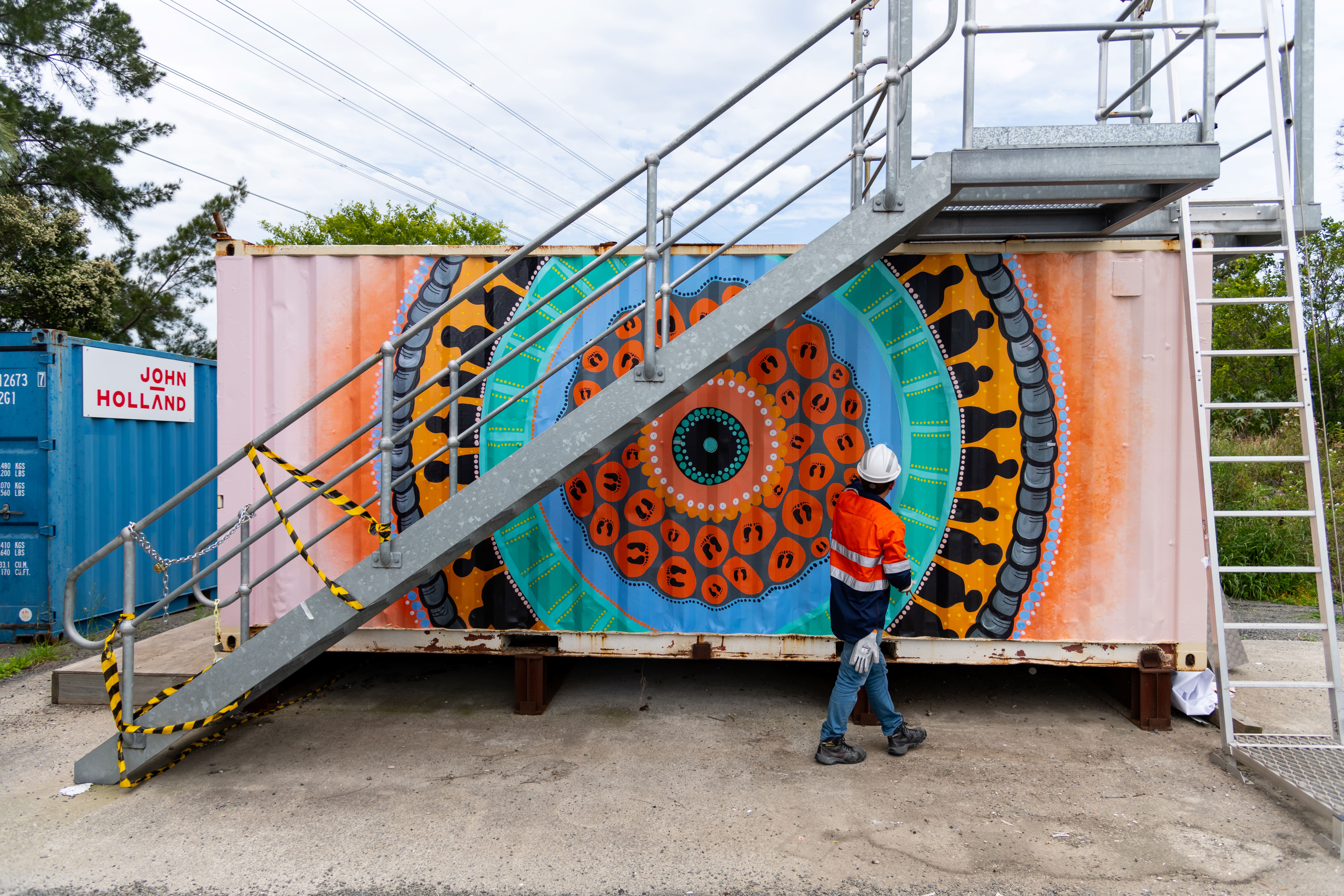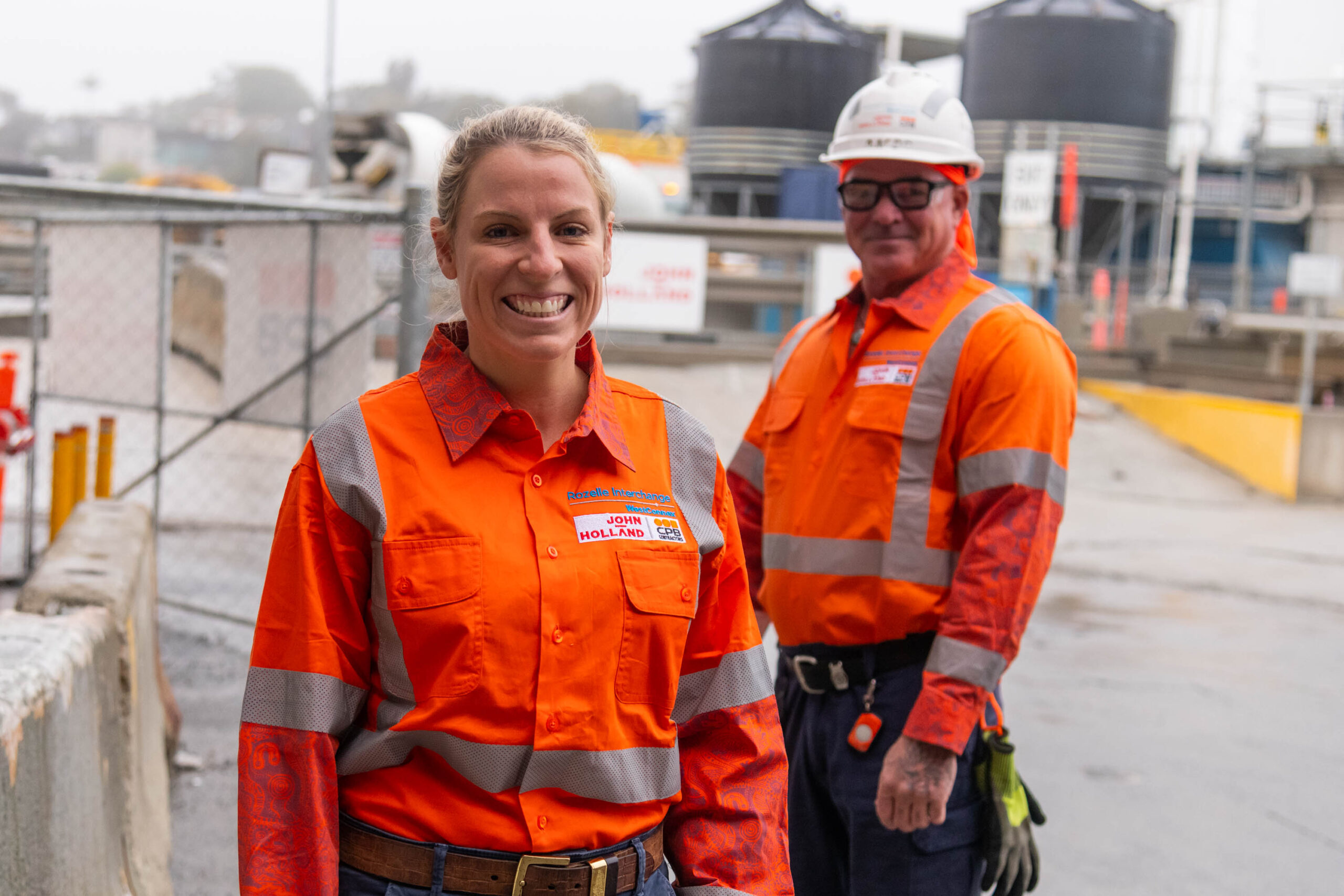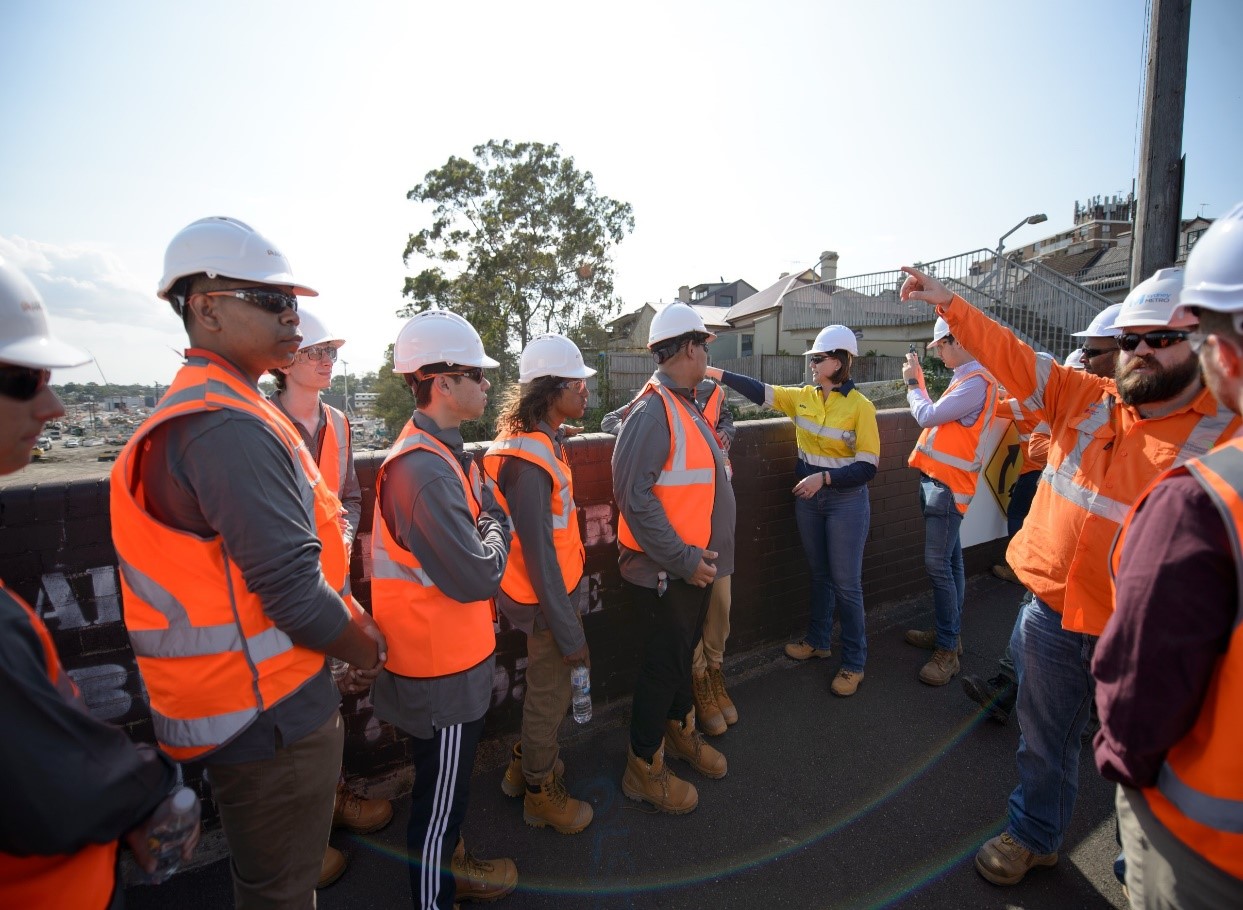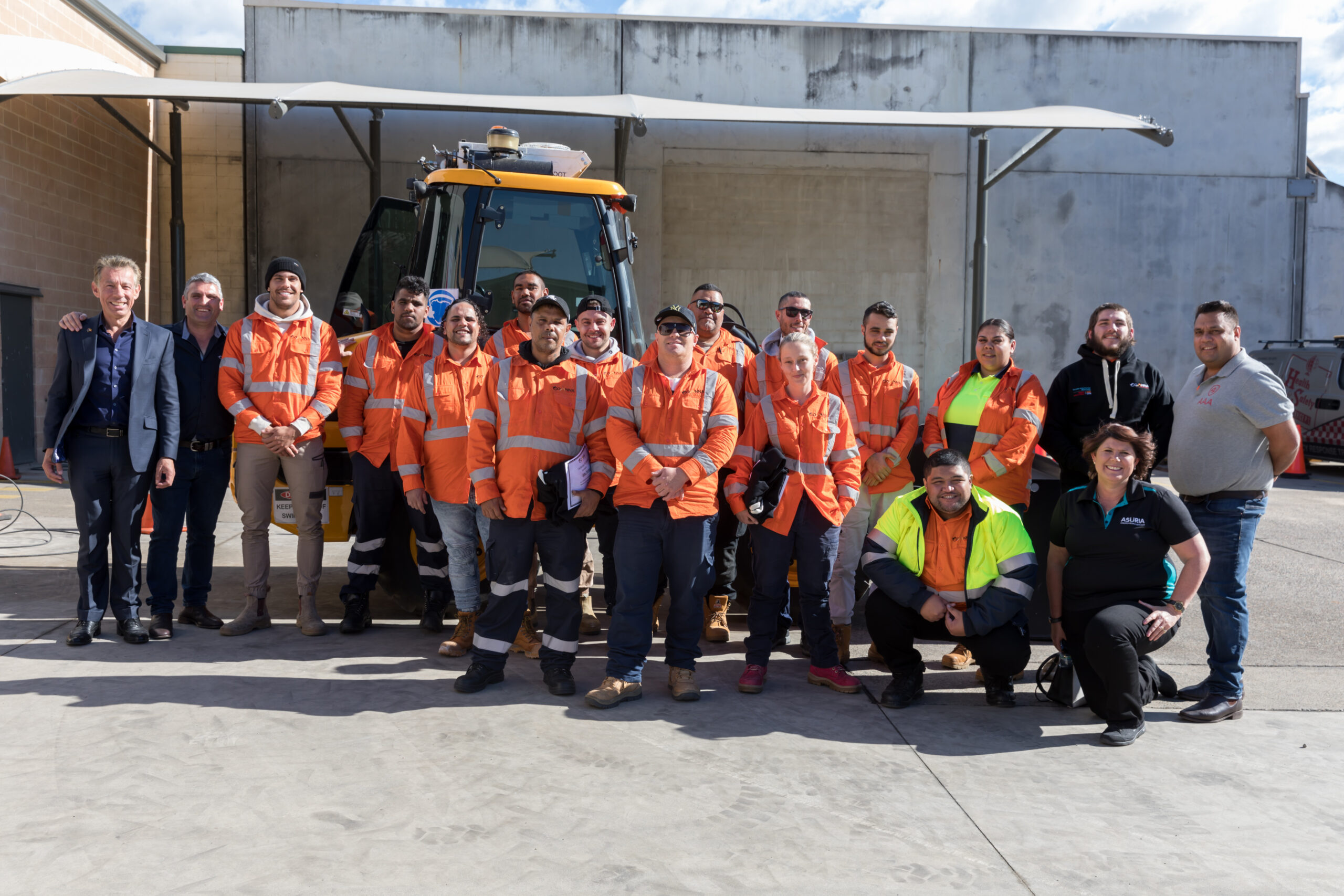The Rozelle Interchange Project and Western Harbour Tunnel Southern Tunnel Works – Social Outcomes
Describe WHAT you have done and HOW you have done it.
The John Holland CPB Contractors Joint Venture (JHCPB) has been contracted by Transport for New South Wales (TfNSW) to deliver the $4.6 billion Rozelle Interchange Project and Western Harbour Tunnel Southern Tunnel Works (RI).
For JHCPB and TfNSW, RI represented a unique opportunity to drive social inclusion and Aboriginal engagement, and to support jobs and skills growth across a diverse and inclusive workforce.
Aboriginal engagement was successfully integrated by the Project through an Aboriginal Participation in Construction (APiC) Program:
• Following a series of collaborative client-contractor workshops, JHCPB committed to investing $44.7 million of Project spend on its APiC program, equating to 1.5% of qualifying Project spend. The value of this commitment was unprecedented in the NSW construction industry.
• The Project’s APiC commitment was achieved in 2021, approximately halfway through the Project’s construction program. Since then, the Project almost tripled its APiC target, with total APiC investment currently at $132.3 million (1 July 2023).
• This industry-leading achievement was delivered through a multi-pronged approach:
- Education, Training and Cultural Awareness. Training was delivered to staff and subcontractors to introduce the APiC Program and enhance cultural awareness across the Project. Training has included unconscious bias, cultural awareness, APiC commercial, APiC induction and subcontractor awareness training. In addition, each year, NAIDOC and Reconciliation Week were recognised through cultural activities, such as presentations from Aboriginal elders, issuing Aboriginal hi-vis PPE, and installing Aboriginal art in Project facilities.
- Systems and Governance. JHCPB recognised that many APIC businesses may not have the resourcing or experience to be competitive significant infrastructure tender participants. The Project introduced a novel procurement process whereby the Contracts team was required to include an Aboriginal subcontractor in every commercial tender, to provide equitable opportunities for Aboriginal businesses to participate in the economic stimulus provided by construction activity. This initiative drove accountability for the project teams to engage with Aboriginal businesses. A dedicated Project APiC Advisor was also appointed to track APiC progress and provide guidance and support to internal staff and APiC subcontractors.
- Targeted Employment. By engaging with Aboriginal recruitment and labour hire organisations, the Project has engaged many Aboriginal workers. To date, 4.35% of project personnel, and 5.03% of direct JHCPB employees, identify as Aboriginal or Torres Strait Islander (compared to 3.4% of NSW’s overall population).
- Heritage. At completion, the Project will deliver a community parkland of up to 10 hectares in size. In recognition of local Aboriginal communities who have inhabited the area for millennia, the Project’s design team has closely incorporated Aboriginal heritage into the parkland through:
o The integration of Aboriginal public art, such as the Victoria Road Underpass feature wall designed by Aboriginal artist Shane Smithers and inspired by the creation narrative of the Dharug People.
o Interpretative heritage signage installations, with content collaboratively developed with the Local Aboriginal Land Council.
o Inclusion of >60 species of native Aboriginal bush food plants.
o Inclusion of yarning circles (traditional Aboriginal community gathering areas).
o An Aboriginal place name for the parkland (name to be announced at opening).
What were the OUTCOMES and how were those outcomes shared?
Outcomes:
The commitment of over $132.2 million in APiC has contributed to ongoing growth and development of Aboriginal businesses and individuals in NSW, including:
• Job creation. Job opportunities were created for 591 Aboriginal and Torres Strait Islander individuals, including at least 31 who were unemployed for >26 weeks prior to commencing at RI.
• Workforce participation and representation. 4.32% of all project personnel, and 5.03% of direct JHCPB employees, identify as Aboriginal or Torres Strait Islander (3.8% of Australians currently identify as Aboriginal or Torres Strait Islander – ABS 2022).
• Skills development. In partnership with Aboriginal Work Placement Provider, Goanna Services, the RI Work Readiness Program was created to provide Aboriginal participants with training, mentoring and employment support. The program led to participants receiving formal qualifications, including a Certificate II/III in Civil Construction. Following completion of this program, 12 participants were offered full-time job opportunities, creating sustainable employment relationships for these individuals.
• Economic participation. Engagement of 25 APiC businesses to deliver key packages and services including electrical equipment supply, cranage, first aid and AOD testing, PPE supply, printing services, general labour and more. In 2022, an independent Aboriginal auditor said “JHCPB’s robust procurement processes… ensure Aboriginal business have full, fair, and reasonable access to subcontracting opportunities” (Curijo Auditor).
• Cultural representation and recognition. Further interweaving of Aboriginal culture and heritage into the fabric of local community via the new Rozelle parklands, to be recognised and enjoyed by the community for years to come. Aboriginal art installations, heritage signs and an Aboriginal place name will firmly establish an Aboriginal character in the parklands.
• Cultural awareness. An ongoing legacy has been left in Aboriginal cultural awareness training, with several hundred project staff having participated in unconscious bias and/or cultural awareness training. For these employees, this training created an enhanced, lifelong understanding of Australia’s diverse Aboriginal cultures.
• Industry-leading APiC commitment. In exceeding its APiC commitment by >290%, the Project demonstrated what is possible and set a new benchmark for diversity and inclusion targets in construction projects. The Project has participated in numerous knowledge share forums (see below) to spread awareness of the possibilities for social inclusion in construction, and share advice on how other projects can achieve similar (or greater) outcomes.
• Innovation. The Project established new, innovative ways to ensure equitable involvement in construction projects for Aboriginal businesses. This included innovating new procurement processes, developing enhanced reporting systems that capitalised on digital technologies to streamline APiC reporting for subcontractors and JHCPB, and embedding APiC commitments in individual performance measurement tools for project leaders and managers.
Sharing outcomes:
• JHCPB presented its APiC program at the NSW Government Construction Leadership Group Forum in 2021 and TfNSW Sustainability Knowledge Share Forum in July 2022. This involved presenting to a wide cross-section of >200 NSW project-based government staff. Some attendees subsequently sought one-on-one meetings with JHCPB to gain further insights into the Project’s APiC program, most notably, DPE Water.
• JHCPB presented at the John Holland Social Procurement Roadshow in 2021 and April 2023.
• In July 2022, the Project’s Sustainability team presented at the TfNSW Roads Projects Sustainability Knowledge Share. Attendees included Sustainability advisors and consultants from TfNSW, Sydney Gateway, WSP and the M12 Project.
• The Project’s APiC Advisor regularly met with other projects to share knowledge of RI’s APiC program and provide advice on how they could develop their own social inclusion programs.
• JHCPB participated in quarterly knowledge share forums between Transurban, TfNSW, WestConnex M4-M8 Link and RI. The achievement of APiC objectives was regularly discussed in these forums.
• Initiatives were shared internally through the Project’s sustainability portal, newsletters, videos ( https://vimeo.com/771782616/64edae23b2) inductions and special events such as NAIDOC and Reconciliation Weeks.
• The Project developed an ‘Embracing Aboriginal Participation in Construction’ pack that covered how the Project achieved its APiC commitment. This pack was shared project-wide, to TfNSW and the broader John Holland and CPB businesses.
• A series of one-page information documents were produced to give bite-sized summaries of APIC achievements. These documents are hosted on the external RI website, making it accessible to all employees, subcontractors and external entities.
Describe WHO benefited from your initiative, innovation, or approach?
• Aboriginal and Torres Strait Islander workers have accessed meaningful employment opportunities and support networks through the Project’s targeted employment and Aboriginal pre-employment program. Job opportunities were created for 591 Aboriginal and Torres Strait Islander individuals, including at least 31 who were unemployed for >26 weeks prior to commencing at RI. The RI Work Readiness Program saw participants receive training, mentoring and employment support, and led to participants receiving formal qualifications, including a Certificate II/III in Civil Construction. 12 participants were offered full-time job opportunities following successful completion of the program.
• 25 Aboriginal businesses have directly benefited from the Project’s APiC strategy and investment, enabling their expansion and capacity building.
Spirit Digital, one of the Project’s APiC businesses, said “Our relationship supplying [the Project] with print & design services over the last few years has allowed our business to not only survive through COVID, but thrive. Enabling us to grow our team, employing a print apprentice and an Aboriginal junior design team member, and expand into a larger premises... The impact has been sensational in terms of the growth of the business”– Glen Ella, General Manager, Spirit Group.
ARA Aboriginal Services said “As an Aboriginal business, we are extremely proud to play a significant part in the Project throughout the project we have been able to create many opportunities for our community to come in and learn with some of the best of the business their craft in the tunnelling and infrastructure industry.” – Rohan Tobler Williams, ARA Aboriginal Services.
• The Project and wider construction industry benefits from a more diverse and inclusive workforce and contributing to addressing the wider infrastructure skills shortage. In a recent internal commercial APiC survey, the Project’s staff were asked to review APiC business performance, and the results were overwhelmingly positive. The survey showed 70% of APiC businesses had exceeded performance expectations, and 30% of businesses had met expectations. In the 2022 staff engagement survey, over 89% of employees either ‘agreed’ or ‘strongly agreed’ that the Project’s social responsibility initiatives were important to them.
• The local community will benefit from a greater connection to country, with the future Rozelle parklands providing an enriching community experience through the sharing of knowledge about Aboriginal culture and pre-European settlement history.
What LEGACY and UN SDG CONTRIBUTION was achieved?
JHCPB is pleased to have delivered beneficial social outcomes and left a positive legacy through its APiC program.
An independent Aboriginal audit project review in 2022 said “The approach implemented by JHCPB to Aboriginal participation with this project is an excellent example that could be applied for similarly large construction projects in the future. This includes a committed and positive approach to employment directly or through subcontractors, training, and upskilling.” – Curijo Auditor, 2022
The Project’s APiC legacy aligns with numerous UN Sustainable Development Goals:
SDG 4 (Quality education)
• Adult education.
o The RI Work Readiness Program saw participants receive training, mentoring and employment support, and led to participants receiving formal qualifications, including a Certificate II/III in Civil Construction. Participant feedback shows a highly positive legacy was created:
“I got my qualifications and it allowed me to progress”
“This was finally a chance to earn a good income”
“I’ve been able to learn different aspects of tunnelling, getting more training and workplace skills”
o Staff training. Several hundred RI personnel received unconscious bias and cultural awareness training, giving them a better understanding of Aboriginal cultures and the importance of social inclusion.
• Youth education.
o In 2019 the Project welcomed 25 students from the Aboriginal Australian Engineering School (IAES) for a site tour. The visit broadened students’ understanding of construction and encouraged them to complete high school, study engineering at university and become professional engineers.
o In 2023, through its nominated project charity HMEF, the Project sponsored Mya; a Year 9 Aboriginal and Torres Strait Islander high school student. Mya’s scholarship valuing $20,000 provides her study support, access to a laptop to complete schoolwork, mentorship and school supplies.
SDG 8 (Decent work and economic growth)
• Through targeted employment, Aboriginal communities have had equitable opportunities to participate in the work and economic growth opportunities of the construction industry. Job opportunities were created for 591 Aboriginal and Torres Strait Islander individuals, including at least 31 who were unemployed for >26 weeks prior to commencing at RI. This is reflected in the Project’s above-average Aboriginal workforce representation: 4.32% of all project personnel, and 5.03% of direct JHCPB employees, identify as Aboriginal or Torres Strait Islander (3.4% of NSW’s population currently identify as Aboriginal or Torres Strait Islander – ABS 2022).
SDG 9 (Fostering innovation in industry and infrastructure)
• When the Project first established its APiC commitment of $44.7 million, no other NSW-based construction project had ever made such an ambitious commitment to social inclusion. The Project’s success in achieving over 290% of this commitment has prompted discussions amongst government departments on whether APiC targets can now be raised (Construction Leadership Group Forum December 2021).
• The Project’s innovations in systems and governance have included revolutionising its procurement processes to integrate an Aboriginal business in every tender. This process was embedded into Project management systems, processes and forms, and commercial staff were directly answerable to the Project Director to ensure this process was followed. Other innovations include digitising APiC reporting to streamline the process for JHCPB and subcontractors. Such innovations have been shared to the broader industry through knowledge share events, and have since been adopted on other Sydney-based construction projects, showing a true APiC legacy has been created.
SDG 10 (reducing inequalities)
• The effect of the many APiC initiatives noted above is that the RI has reduced inequalities in access to employment, training and economic opportunities for Aboriginal individuals and businesses. Through its APiC Program, the Project has made a small but meaningful impact in overcoming the wider entrenched disadvantage faced by Aboriginal communities.
[embed]https://vimeo.com/845157330/a866339418[/embed]






